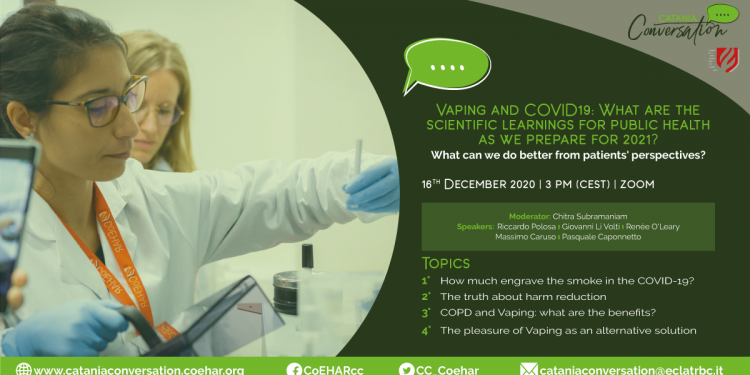After the success of the opening edition last spring, Catania Conversation’s activities continue.
“Vaping and COVID19: What are some of the key scientific learnings for public health and vaping as we prepare for 2021? What can we do better from patients’ perspectives?” the title of the event of last 16th December, where some of the most important names in the field of Harm Reduction discussed different topics, including the Public Health Response to the COvid-19 pandemic.
The meeting was a chance of interaction between patients, vapers associations, and the researcher of CoEHAR, through an informal conversation, where every participant, expert, patient, and communication expert could discuss freely.
The pandemic has forced scientific research into public discussion and governments’ agenda to carry information through the right communication channels, contributing to progress and innovation.
Accurate and conscious choices, remarked by every speaker.
To open and close the debate, Prof. Riccardo Polosa, Founder of the CoEHAR, underlined the relevance of investigating health issues from the perspective of patients, researchers, and media experts, finding a thread that takes account of each specific need.
“Damages that comes from the toxic components inside cigarette smoke are often confused with the nicotine addiction: two completely different things. Data says long-term use of less harmful products improves lung functions and clinical outcomes. We need to disseminate more accurate info among physicians: nicotine is addictive but is not the cause of diseases”.
Renèe O’Leary, CoEHAR’s researcher and project leader of In Silico Science was one of the orators. She stressed that there is a need for greater standardization of the research methodologies for low-risk products.
“It is positive to disseminate the idea that substituting the conventional cigarettes with the ecigs lead to health improvements. This has been possible because in the last 5 years the number of scientific evidence and data has increased. In Silico Science, we are systematically verifying every study on ecigs concerning respiratory and cardiovascular health, and weight management in smoking cessation programs”
Massimo Caruso, Project Leader of Replica, and Pasquale Caponnetto, Coordinator of the anti-smoking center of Catania Vittorio Emanuele Polyclinic were also among the speakers.
“Different research underlined low percentage of smokers among those who contracted Covid-19 worldwide. It doesn’t mean that smoking works as a protective factor, but we need to carry on with an evaluation of protein ACE2 as a factor that somehow interacts with the contagion.”
“Every six seconds a person dies because of tobacco. Smokers of any age can obtain substantial health benefits by quitting. Pleasant sensory experiences may be missing links in the effectiveness of current cessation medications. So far, our knowledge on e-cigarettes is the most potential substitutes that provide the sensory experience and cues that appear to be important for smoking cessation.”






